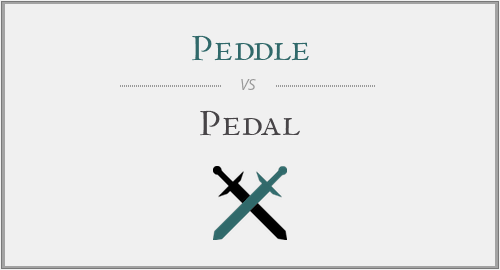English spelling is full of apparent idiosyncrasies – native speakers and learners alike grapple with doubling consonants, how to form plurals, ‘i’ before ‘e’ except after ‘c’’, and have to dodge umpteen other potential pitfalls. Another rich source of mistakes is the fact that English contains pairs of similar-sounding words (homophones). These words have different meanings and spellings but, when spoken, they sound exactly the same. One such example is peddle and pedal.
He pedaled away his boat deep in the lake.
He had been told to peddle his papers elsewhere.
This article will discuss all there is to know about these two homophones; their origin, usage and examples.
Origin:
The word peddle originated in early 16th century: back-formation from pedlar. The word pedal originated in early 17th century (denoting a foot-operated lever of an organ): from French pédale, from Italian pedale, from Latin pedalis ‘a foot in length’, from pes, ped- ‘foot’.
Peddle as verb:
The word peddle is used as a verb in English language where it means to try to sell (something, especially small goods) by going from place to place.
He peddled printing materials around the country.
Peddle also implies the meaning of selling an illegal drug or stolen item.
Youths involved in drug peddling are everywhere these days.
To promote (an idea or view) persistently or widely is also called peddle.
The giant con that has been peddled in the Conservative press.
Pedal as noun:
Pedal is used as a noun in English language where it means each of a pair of foot-operated levers used for powering a bicycle or other vehicle propelled by the legs.

A foot-operated throttle, brake, or clutch control in a motor vehicle is also called a pedal.
“Hit the brake pedal!”
Pedal is also each of a set of two or three levers on a piano, particularly (also sustaining pedal ) one which, when depressed, prevents the dampers from stopping the sound when the keys are released. The second is the soft pedal; a third, if present, produces either selective sustaining or complete muffling of the tone.
Pedal as verb:
Pedal is also used as a verb in English language where it means to move by working the pedals of a bicycle.
They pedaled along the canal towpath.
To move (a bicycle) by working its pedals, is another way of using pedal.
She was pedaling a bicycle around town.
To use the pedals of a piano, organ, etc., especially in a particular style is also called pedal.
Chopin gave no indications of pedaling in his manuscript.
Peddle or pedal:
A pedal is a lever controlled with the foot, such as found on a piano or a bicycle. To pedal is to use such a lever to control something. It descends from the Late Latin pedale, for a thing of the foot, which descends ultimately from the Latin pēs, for foot. To peddle can mean to travel around selling items (think door-to-door salesmen). It can also mean to sell illicit drugs or, informally, to give out or spread, as with information or lies. Remember that pedal is related to foot through the Latin pēs and that someone who peddles goods goes from door to door.




Have a discussion about this article with the community:
Report Comment
We're doing our best to make sure our content is useful, accurate and safe.
If by any chance you spot an inappropriate comment while navigating through our website please use this form to let us know, and we'll take care of it shortly.
Attachment
You need to be logged in to favorite.
Log In